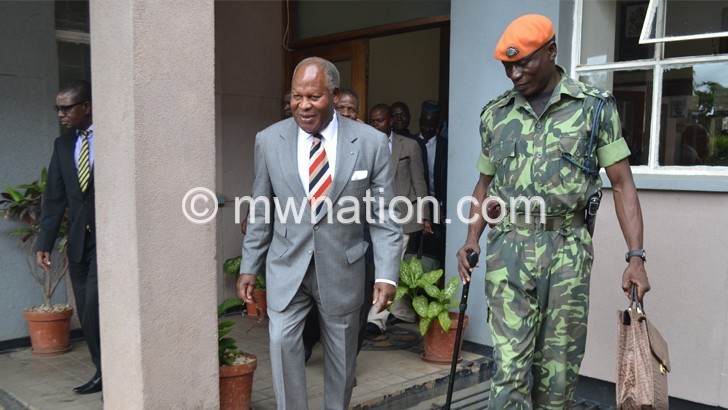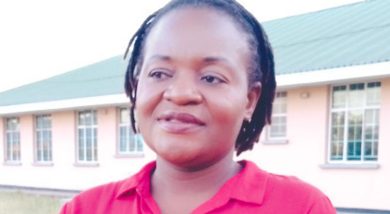Discontinuance of cases drew mixed reactions in 2023
The year 2023 cannot go without reflecting on some major events that happened in the country’s courts such as discontinuation of some the high profile cases, including the K1.7 billion corruption case involving former president Bakili Muluzi.
On May 29 2023, the High Court of Malawi sitting in Blantyre exenorated Muluzi from all charges in the $12 million abuse of public funds case that had dragged for about 14 years after Director of Public Prosecutions (DPP) Masauko Chamkakala issued a certificate of discontinuance dated May 26 2023.

In a report to the Legal Affairs Committee of Parliament, DPP cited lack of evidence and unavailability of State witnesses as key factors that influenced the discharge of Muluzi’s case.
The reasons did not please Malawi Law Society (MLS) which asked for detailed clarification from Chamkakala on the justification.
In a letter dated June 16 2023 signed by MLS president Patrick Mpaka, the society asked the Legal Affairs Committee of Parliament to facilitate the process, stating that at the time the DPP discontinued the case, the Anti-Corruption Bureau (ACB) had, a week earlier on May 21 2023, issued and lodged with the court a list of 29 witnesses for the case.
MLS further indicated that it also found that on May 22 2023, the ACB also filed an application seeking to consolidate the criminal proceedings against Muluzi.
Reads the letter in part: “All this suggests on its face that the public prosecutors involved in the actual prosecution had the evidence and the witnesses and were willing to prosecute when the Director of Public Prosecutions discontinued it on 26th May 2023 or thereabouts in exercise of his legal authority.
“The trial of a former president of a country, let alone on corruption related charges, is no doubt a consequential matter and we trust that the Director of Public Prosecutions’ decision to discontinue such a matter under the foregoing circumstances should have been circumspect.”
Chamkakala’s decision attracted further mixed reactions from legal experts with South Africa-based legal scholar Danwood Chirwa and lawyer Justin Dzonzi observing that the discontinuance of the case pointed to the country’s failure to prosecute high-profile corruption cases.
Chirwa, a professor of law at the University of Cape Town in South Africa said the discontinuance of the case exposed the mockery of the Malawian anti-corruption effort and “represents the lowest watermark for the ACB in terms of its record of prosecutions and convictions”.
He said: “This institution [ACB] has truly become a toothless bulldog. The discontinuance shows, once again, that corruption by those at the top will be tolerated and left unpunished, at great expense to Malawians.
“This is why every government is engulfed in unending cycles of looting, corruption and embezzlement. As chances of accountability range from minimal to zero, there’s no disincentive to such bad behaviour.”
Dzonzi, on the other hand, said people’s expectations were to see Muluzi’s case concluded in court.
Five months after the DPP issued a certificate of discontinuance on Muluzi case, the High Court also on October 18, freed former vice-president Cassim Chilumpha and his co-accused former politician and businessperson Yusuf Matumula unconditionally from the treason case.
The two were accused of plotting to assassinate former president Bingu wa Mutharika and were charged with offences of treason contrary to Section 38 of the Penal Code and conspiracy to murder contrary to Section 227 of the Penal Code.
High Court Judge Ruth Chinangwa in her ruling observed that the State had showed no willingness to prosecute the matter, having remained dormant for over 15 years, hence the decision.
Two days before Christmas, the High Court also freed 11 accused persons in the K16.5 billion tax evasion case involving Mapeto David Whitehead and Sons (DWS) Limited executives and two Malawi Revenue Authority (MRA) customs officers. The court’s decision follows a certificate of discontinuance which Chamkakala issued on December 18 2023.
Inadvertently, the certificate of discontinuance was filed at the High Court’s principal registry revenue division in Blantyre few hours after the presiding High Court Judge Joseph Chigona had already set dates to commence the full trial of the matter from January 23 to 25 20024.
In a written response on December 24, Mpaka said the continued discontinuation and withdrawal of high profile cases is worrisome.
“The growing trend of State pardons, discontinuation and withdrawals in high-profile criminal cases is worrisome and suggestive of a captured State machinery,” he said.
Section 77 (i) states: “In any criminal proceedings, and at any stage thereof before judgement is pronounced, the Director of Public Prosecutions may enter a discontinuance, either by stating in court or informing the court in writing, that the State intends that the proceedings shall not continue, and thereupon.”
Under Section 99(3) of the Constitution, the DPP is required to explain the reasons for discontinuance to the Legal Affairs Committee of Parliament within 10 days after the order.






One Comment